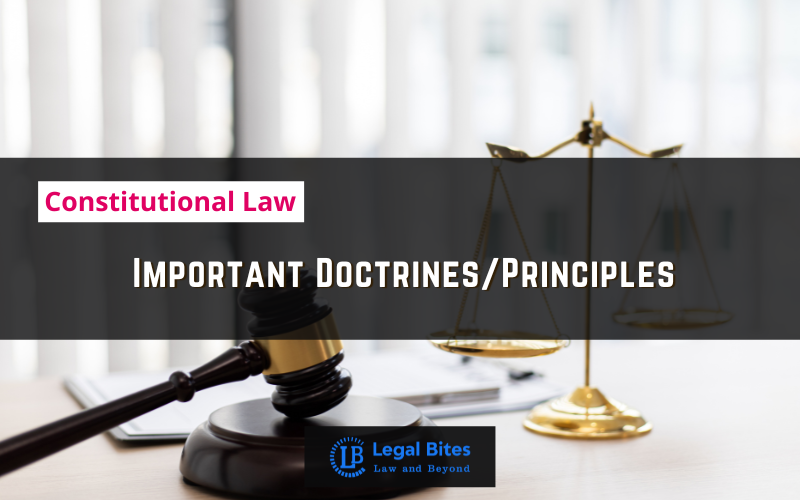Discuss critically the provisions in the Indian Constitution guaranteeing protection to the minorities in India.
Question: Discuss critically the provisions in the Indian Constitution guaranteeing protection to the minorities in India. [BJS 1978] Find the answer to the mains question only on Legal Bites. [Discuss critically the provisions in the Indian Constitution guaranteeing protection to the minorities in India.] Answer Although the term ‘minorities’ is not defined in the Constitution, from the Constituent… Read More »
;
Question: Discuss critically the provisions in the Indian Constitution guaranteeing protection to the minorities in India. [BJS 1978] Find the answer to the mains question only on Legal Bites. [Discuss critically the provisions in the Indian Constitution guaranteeing protection to the minorities in India.] Answer Although the term ‘minorities’ is not defined in the Constitution, from the Constituent Assembly Debates, it can be gathered that the Constitution Makers used it to...
Question: Discuss critically the provisions in the Indian Constitution guaranteeing protection to the minorities in India. [BJS 1978]
Find the answer to the mains question only on Legal Bites. [Discuss critically the provisions in the Indian Constitution guaranteeing protection to the minorities in India.]
Answer
Although the term ‘minorities’ is not defined in the Constitution, from the Constituent Assembly Debates, it can be gathered that the Constitution Makers used it to connote numerically vulnerable groups in the power equation of the State population. Both Article 29 and Articles 30 guarantee certain rights to the minorities so as to enable them to conserve their own language, script, culture, and prevent discrimination against minorities on grounds of only religion, race, language, or any of them in educational institutions. This entails two types of minorities: linguistic and religious minorities.
Whilst Article 29 protects the interests of the minorities by making a provision that any citizen or section of citizens having a distinct language, script, or culture has the right to conserve the same. Article 29 mandates that no discrimination would be done on the ground of religion, race, caste, language or any of them.
On the other hand, Article 30 of the Indian Constitution states the right of minorities to establish and administer educational institutions. It says: “All minorities, whether based on religion or language, shall have the right to establish and administer educational institutions of their choice.” Article 30 consists of provisions that safeguard various rights of the minority community in the country keeping in mind the principle of equality as well. The provisions mentioned are as follow:
- Article 30(1) says that all minorities, whether based on religion or language, shall have the right to establish and administer educational institutions of their choice.
- Article 30(1A) deals with the fixation of the amount for acquisition of property of any educational institution established by minority groups.
- Article 30(2) states that the government should not discriminate against any educational institution on the ground that it is under the management of a minority, whether based on religion or language while giving aid.
In St. Xaviers College v. State of Gujarat [1974 AIR 1389], the Supreme Court observed that Article 29 (1) is general protection given to sections of citizens to conserve their language, script, or culture, whereas Section 20 is a general right to minorities to establish educations institutions of their choice. In a landmark judgment of T.M.A Pai Foundation v. State of Karnataka [AIR 2003 SC 355], the Apex Court ruled that a state will be regarded as the unit for determining both ‘linguistic minority as well as ‘religious minority.
In Champakam Dorairajan v. the State of Madras [1951 AIR 226]–the case involved the admission of students to medical and engineering colleges of Madras. The province of Madras was having an issue with the order of fixation of the number of seats for particular communities. The Supreme Court, in this case, rejected reservations for minorities on the communal ground.
Important Mains Questions Series for Judiciary, APO & University Exams
- Constitutional Law Mains Questions Series Part-I
- Constitutional Law Mains Questions Series Part-I
- Constitutional Law Mains Questions Series Part-II
- Constitutional Law Mains Questions Series Part-IV
- Constitutional Law Mains Questions Series Part-V
- Constitutional Law Mains Questions Series Part-VI
- Constitutional Law Mains Questions Series Part-VII
- Constitutional Law Mains Questions Series Part-VIII
- Constitutional Law Mains Questions Series Part-IX
- Constitutional Law Mains Questions Series Part-X



